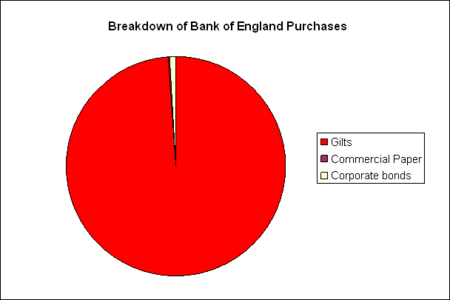With another £40bn disappearing down the black hole known as the British Banking sector, the financial cost of the economic and banking collapse is now only rivaled by the two World Wars in it’s cost to the UK taxpayer. Rather than going to support credit to business or households, the further £25bn of “newly printed money” announced today is likely to go to help prop up the Government debt mountain.

The above chart shows how the Bank of England has been using quantative easing since March. 98.8 per cent has been used to purchase Gilts. As fast as the Debt Management Office “sells” Gilts to the “market”, the Bank of England shows up and buys them. The investment banks have been making a nice turn in recent months out of transferring money from one arm of the Government to another. The fact the new money is being laundered back to the Government via the investment banks does not change the economic reality of this process: the Bank of England is financing the Government’s debt needs via printing money in the manner of the Weimar Republic and Zimbabwe.

The above chart shows who has bought and sold Gilts since the Bank of England started its money printing programme. The only buyer of Government debt in the UK has been the Government itself. All other investors have used the Bank of England’s buying as a route to exit. With the Bank finally acknowledging that a collapsing currency, soaring oil price and consumption taxes may lead to rising inflation in the coming months, its ability to continue rolling the printing press is going to be increasingly difficult.
The belief that lack of money supply is the key restraint on the UK economy, which is being used as the cover for financing the deficit in this way, is misguided. Rather than simply expanding the amount of money in the economy and giving it all to the Government, economic policy needs to be directed at restoring the flow of credit and reducing the cost of existing debt for the private sector. If the Bank was serious about using new money to improve credit availability, they could have followed the example of the Federal Reserve and European Central Bank in directing asset purchases to mortgage and credit related assets. The vast majority of Fed asset purchases were of mortgage bonds.

The key problem the UK private sector faces is a lack of credit due to a bust banking system. The above chart shows the average rate on a new mortgage taken out in the UK each month – this has stuck resolutely around 4.4% since the money printing programme was launched in March. Net lending growth also remains floored. Without a well functioning credit intermediary, the private sector simply can’t recover. The fix to this is not printing money to fund government deficits, but to fully resolve the bad debt and capital issues of the banking sector. With the Federal Reserve in the US now stepping back from its money printing to purchase assets, the UK is left alone now in its printing money “solution” to the recession. The Bank risks collapsing the Pound through further printing and a surge in inflation; the practice is amplifying rather than resolving the UK’s economic crisis.






Comments